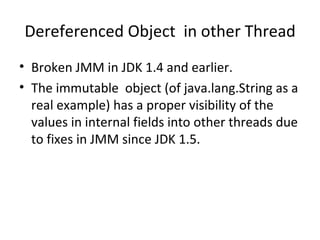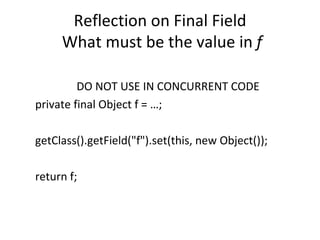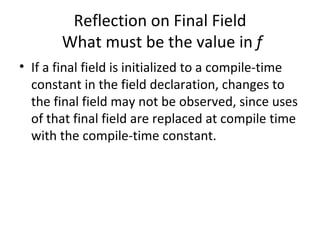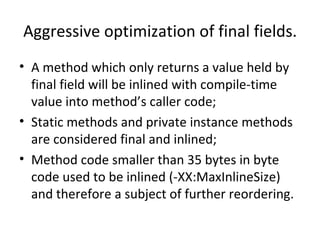Java Objects Constructed Within The Final Field Safe Context
- 1. Objects Constructed within the Final Field Safe Context Tibor Digana
- 2. Normal Field on an Instance What must be the value in provider.f Thread 2 Thread 1 provider = new FinalFieldExample(); <read> provider.f; class FinalFieldExample { private Object f; FinalFieldExample() { f = new Object(); } }
- 3. Normal Field on an Instance What must be the value in provider.f ŌĆó No guarantee of proper visibility of values by a read in <f> in Thread 2.
- 4. Final Field on an Instance What must be the value in provider.f Thread 2 Thread 1 provider = new FinalFieldExample(); <read> provider.f; class FinalFieldExample { private final Object f; FinalFieldExample() { f = new Object(); } }
- 5. Final Field on an Instance What must be the value in provider.f ŌĆó The visibility of values in <f> is guaranteed by a read in Thread 2.
- 6. Volatile field on an Instance What must be the value in provider.f Thread 2 Thread 1 provider = new FinalFieldExample(); <read> provider.f; class FinalFieldExample { private volatile Object f = null; FinalFieldExample() { f = new Object(); } }
- 7. Volatile field on an Instance What must be the value in provider.f ŌĆó No guarantee of proper visibility of values in <f> by a read in Thread 2. ŌĆó ConstructorŌĆÖs freeze and the guarantees apply only to objects with final fields. ŌĆó An object is considered to be completely initialized when its constructor finishes.
- 8. Dereferenced Object in other Thread Thread 2 Thread 1 Use of s. s = new String() An implementation detail. The java.lang.String has private members char value[] int offset int count int hash
- 9. Dereferenced Object in other Thread ŌĆó Broken JMM in JDK 1.4 and earlier. ŌĆó The immutable object (of java.lang.String as a real example) has a proper visibility of the values in internal fields into other threads due to fixes in JMM since JDK 1.5.
- 10. Combined Fields on an Instance What must be the values. Thread 2 Thread 1 provider = new FinalFieldExample(); <read> provider.f; class FinalFieldExample { <read> provider.x; private final Object f; private Object x; FinalFieldExample() { x = new Object(); f = new Object(); } }
- 11. Combined Fields on an Instance What must be the values. ŌĆó Suppose<provider> is non-final field, non-null. ŌĆó The value which is set to <x> in the constructor has improper visibility in Thread 2. ŌĆó Value assigned to <f> is properly visible to Thread 2. ŌĆó Dereference and Memory Chains for the read of <f> in Thread 2 can pass through any reads by Thread 2 of a reference to <provider>.
- 12. Combined Fields on an Instance What must be the values. Thread 2 Thread 1 provider = new FinalFieldExample(); <read> provider.f; class FinalFieldExample { <read> provider.g; private final Object f; <read> provider.a; private final Object g; <read> provider.b; private Object a, b, c, d; <read> provider.c; <read> provider.d; FinalFieldExample() { a = new Object(); b = new Object(); f = new Object(); c = new Object(); g = new Object(); d = new Object(); } }
- 13. Combined Fields on an Instance What must be the values. ŌĆó Values in a, b, c, and d have no guarantee to be properly visible by a read in Thread 2. (see previous slide) ŌĆó Since the <f> and <g> are final, their operations cannot be reordered with other. ŌĆó Operations on <a>, <b> can be reordered. ŌĆó <c> is always between <f> and <g>. ŌĆó <d> stays behind <g>
- 14. Reflection on Final Field What must be the value in f DO NOT USE IN CONCURRENT CODE private final Object f = ŌĆ”; getClass().getField("f").set(this, new Object()); return f;
- 15. Reflection on Final Field What must be the value in f ŌĆó If a final field is initialized to a compile-time constant in the field declaration, changes to the final field may not be observed, since uses of that final field are replaced at compile time with the compile-time constant.
- 16. Aggressive optimization of final fields. ŌĆó Within a thread, it is permissible to reorder reads of a final field with calls to methods that may change final fields via reflection. ŌĆó Reflection can be used to change final fields after the constructor for the object completes.
- 17. Aggressive optimization of final fields. ŌĆó A method which only returns a value held by final field will be inlined with compile-time value into methodŌĆÖs caller code; ŌĆó Static methods and private instance methods are considered final and inlined; ŌĆó Method code smaller than 35 bytes in byte code used to be inlined (-XX:MaxInlineSize) and therefore a subject of further reordering.

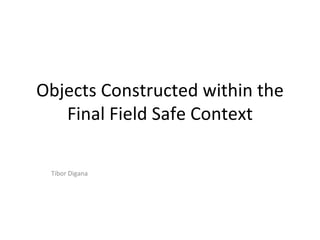




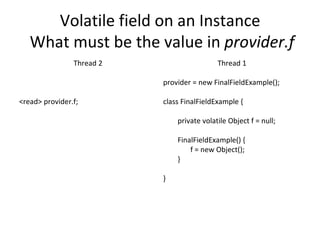

![Dereferenced Object in other Thread
Thread 2 Thread 1
Use of s. s = new String()
An implementation detail.
The java.lang.String has private members
char value[]
int offset
int count
int hash](https://image.slidesharecdn.com/objectsconstructedwithinthefinalfieldsafecontext-13278633650382-phpapp02-120129130037-phpapp02/85/Java-Objects-Constructed-Within-The-Final-Field-Safe-Context-8-320.jpg)
